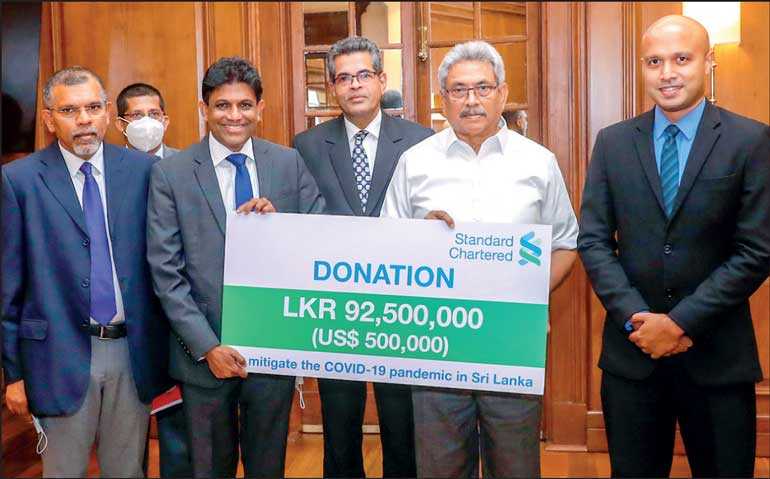Saturday Feb 21, 2026
Saturday Feb 21, 2026
Monday, 31 August 2020 00:07 - - {{hitsCtrl.values.hits}}

President Gotabaya Rajapaksa symbolically accepting the donation from Standard Chartered Sri Lanka CEO Bingumal Thewarathanthri (third from left), in the presence of Sri Lanka Red Cross Society Director General Dr. Mahesh Gunasekara (left), State Intelligence Service Director Maj. Gen. Suresh Sallay (second from left), Ministry of Health Secretary Maj. Gen. Dr. Sanjeewa Munasinghe (third from right) and Standard Chartered Sri Lanka Head of Corporate Affairs, Brand and Marketing Anuk De Silva (right)
Standard Chartered Sri Lanka has made donations totalling $ 500,000 (approximately Rs. 92.5 million) to support the fight against COVID-19 in the local community.
The donation, which will flow through the Sri Lanka Red Cross Society (SLRCS), is in keeping with its brand promise to be ‘Here for good’ and is part of the bank’s wider response to the COVID-19 global pandemic.
The funding is made up of two parts: $ 300,000 from Standard Chartered PLC will support emergency relief activities that target the control and containment of coronavirus, precaution against infection, and public awareness to combat misinformation on COVID-19.
These funds are part of the Group’s $ 5 million donation to Red Cross to support urgent medical and humanitarian support in countries across Africa and Asia from its $ 50 million COVID-19 Global Charitable Fund; and $ 200,000 from Standard Chartered Sri Lanka for the procurement of approximately 13,000 COVID-19 testing kits to assist in identifying suspected patients of the virus.
Standard Chartered Sri Lanka CEO Bingumal Thewarathanthri said: “Standard Chartered Sri Lanka is proud to be able to contribute to the fight against COVID-19 in Sri Lanka and we are glad to partner with Red Cross programs that reach the most vulnerable people in our communities.
“By working together, we are able to support the delivery of rapid and effective relief that aims to address some of the current and future challenges created by the COVID-19 pandemic. In addition to supporting our communities at this time of need, we have also gone an extra mile in contributing to the country’s economy in a holistic fashion in the wake of this pandemic.”
SLRCS Director General Dr. Mahesh Gunasekara said: “Thanks to the generosity extended by Standard Chartered, we will be able to enhance the testing capacity of the country, which is vital to help keep people safe from COVID-19.
“It will also enable us to increase a plethora of coronavirus prevention activities including supporting safe environments for school children and raising awareness island-wide to combat the epidemic. We will continue supporting people most at risk in Sri Lanka, working alongside authorities in the face of this devastating COVID-19 pandemic.”
Standard Chartered Group has put in place a range of measures to support clients and communities during the COVID-19 pandemic. Its $ 50 million COVID-19 Global Charitable Fund commits $ 25 million for immediate emergency relief.
This includes the $ 5 million for Red Cross, a $ 5 million donation to UNICEF for educational support for vulnerable children across Asia and Africa and $ 15 million allocated to the Group’s four regions to support emergency relief delivered by local NGOs. The remaining $ 25 million is committed for economic recovery.
In addition to the donation pledge, Standard Chartered Group also put in place a comprehensive support program for clients including $ 1 billion in financing for companies that provide goods and services to help the fight against COVID-19, and those planning the switch into making products that are in high demand to fight the global pandemic.
The funding also caters to a comprehensive support scheme for clients, including loan repayment holidays, fee waivers or cancellations and loan extension facilities.
Leading Sri Lankan apparel manufacturers Brandix and MAS Intimates were recipients of facilities under this program, enabling them to adapt their production facilities for the production of personal protective equipment (PPE) for the US market, at a time when the country’s apparel industry had been severely affected by the pandemic.